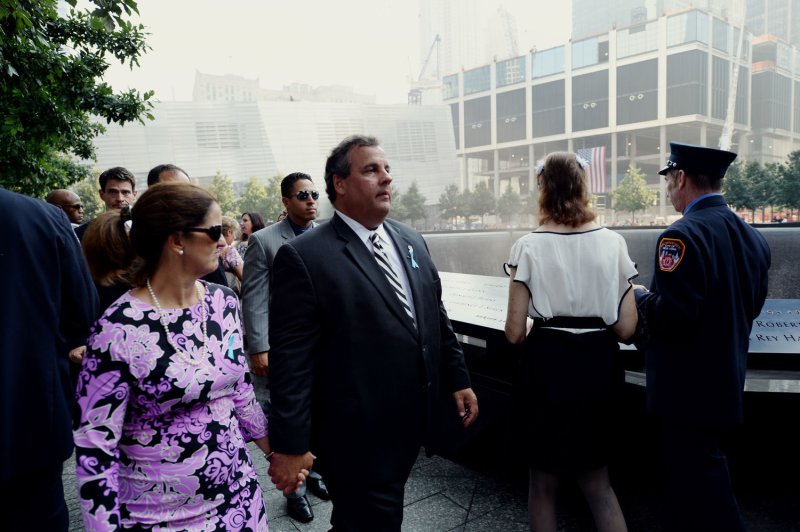1 of 3 | New Jersey Governor Chris Christie (C) with wife Mary Pat Foster (L) at the South reflecting pool at the 9/11 Memorial during ceremonies marking the 12th anniversary of the 9/11 attacks on the World Trade Center in New York, September 11, 2013. UPI/Stan Honda/Pool |
License Photo
Come Tuesday, two men representing the more moderate and more conservative elements of the Republican Party stand for election as their state's gubernatorial races.
In the much watched race in Virginia, depending on the poll, conservative Republican Ken Cuccinelli has either a single- or double-digit deficit to Democrat Terry McAuliffe.
In the Garden State, Republican Gov. Chris Christie holds a huge lead over his Democratic challenger, state Sen. Barbara Buono, in his re-election bid.
A Quinnipiac University poll released last week indicated McAuliffe, a businessman and politically connected former Democratic National Committee chairman, holds a 45 percent-to-41 percent lead over Cuccinelli, Virginia's attorney general, among likely commonwealth voters. Libertarian candidate Robert Sarvis stands at 9 percent. McAuliffe's 4-percentage point edge slipped from a 7-point lead in a Quinnipiac poll a week earlier.
In a Roanoke College poll, McAuliffe holds a 15-point edge, 46 percent to 31 percent, over Cuccinelli in a poll released just before the Quinnipiac survey.
The winner in Virginia will succeed Republican Gov. Bob McDonnell.
"With the race this close, the final decision by the roughly one in 10 voters who are supporting Libertarian Robert Sarvis has become even more critical. Nationally, third-party candidates often lose support in the end as voters enter the voting booth and back someone they consider the lesser of two evils. Only six in 10 Sarvis supporters say they definitely will vote for him. Almost nine in 10 McAuliffe and Cuccinelli backers are committed," said Peter A. Brown, assistant director of the Quinnipiac University Polling Institute.
"At this point, Cuccinelli has to hope that voting for him is a much stronger motivator than voting against him," Harry Wilson, director of the Institute for Policy and Opinion Research, told CNN.
While considered a hero to many Tea Party supporters and other grassroots activists because of his public conservative crusades, including his fight against the Affordable Care Act, aka Obamacare, Cuccinelli brought out some big guns to get conservative voters to the polls: Two-term Louisiana Gov. Bobby Jindal, Sen. Rand Paul of Kentucky, former Arkansas Gov. Mike Huckabee, a 2008 GOP presidential candidate, and Nikki Haley, South Carolina's GOP governor.
Paul called Cuccinelli "the first attorney general to sue over Obamacare" and predicted "he'll be a leader in defending Virginia against an overzealous government."
But Cuccinelli reliance on the conservative base hamstrings him when criticizing Tea Party-supported congressional members who pushed to defund the national healthcare law to continue funding the federal government, resulting in a two-week shutdown.
"The shutdown is definitely motivating some voters against Cuccinelli, who already had a Tea Party problem with independents and business-minded Republicans," Quentin Kidd, director of the Wason Center, told CNN.
During a recent political event in Richmond, Va., though, Cuccinelli kept space between himself and Sen. Ted Cruz of Texas, a vocal leader in the drive to dismantle the ACA.
Unlike Cuccinelli, New Jersey's Christie is a blunt-talking moderate Republican with a history of bipartisan work. He caught flak from more conservative members of his party for thanking the Obama administration for its work shortly after Hurricane Sandy devastated New Jersey a year ago.
A RealClearPolitics.com polling average last week indicated he holds a 25-percentage-point lead over Buono.
And he has great rapport with New Jerseyans.
"I told you when I ran four years ago that you wouldn't always agree with me, but every day I would work hard to make you proud that I was your governor," he said during a campaign stop in Fair Lawn last week. "People feel proud to be from this state again. We don't mumble it under our breath."
Opponent Buono is most popular for voting to legalize marijuana nine times, sponsoring the New Jersey's anti-bullying law and protecting homeowners from predatory banking and lending, NYULocal.com said.
A news analysis indicated a record amount of cash from independent groups flowed in New Jersey's statewide elections this year, The Wall Street Journal reported. The state recently conducted a special election to fill the unexpired term of the late Sen. Frank Lautenberg. Besides the gubernatorial race, all 120 legislative seats are also up for elections, along with county and other local positions.
Nearly $38 million has been spent on New Jersey's elections so far, more than twice the now-broken record of $15 million in 2009, figures released last week by the state Election Law Enforcement Commission showed.
Jeff Brindle, the commission's executive director, called the total "mind-boggling."
Christie has outspent Buono, the report indicated.
The incumbent raised more than $13 million and spent $9.2 million, commission figures indicated. Buono collected $2.8 million and spent $2.5 million.
The report said Christie had $4 million in cash in the bank, while Buono had $277,000.















